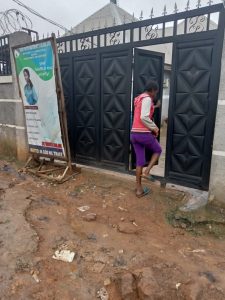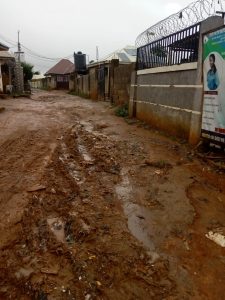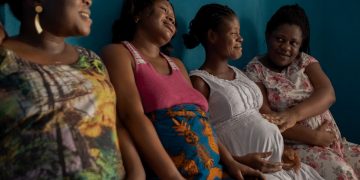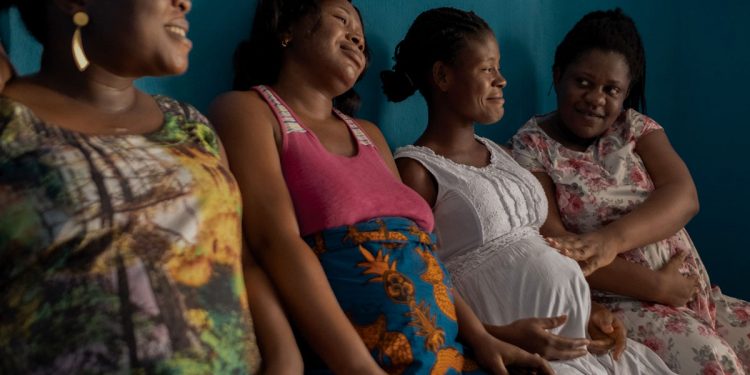By Ere-ebi Agedah
From the popular Gudu cemetery in the FCT it is an estimated 15 minutes drive to Waru community in Abuja Municipal Area Council, AMAC but it took our correspondent almost 35 minutes to locate Waru, due to the traffic congestion, poor state of road and non-stop rain that Monday afternoon.
On reaching Keke bustop as it is called, we requested for a private ride into the community where the terrible stretch of road again continued but the tricycle driver, popularly called Keke declined and the only option left was to use a motorbike, known as okada. Up and down this reporter and her assistant went with the Okada, narrowly escaping crash because of the bad shape of the road. The only available option this time was to continue by foot as we located one Mrs. Favour a resident of Waru community.

Mrs. Favour is a mother of 2 children, who comes all the way to Apo Resettlement to work where she engages in menial jobs of washing clothes, cleaning houses and other domestic chores to support her partner. She narrates to us on why she had her 2 children through a traditional birth attendant.
‘’When you go to the hospitals the whole process appears so cumbersome and complex for me, only the documentation process doctor will question you up and down, after you must have queued since morning, then you now come face to face with all these angry nurses, I don’t know why they are always shouting at pregnant women, then during delivery before you know what is happening they will send you to go and do caesarean section, that one is another plenty of money on its own.
‘‘I used to accompany my former employer to the hospital when she was pregnant and it exposed me to the whole process, so I made up my mind that when I want to have my children I will use my mother’s pattern which I am aware of, having grown up in the village and as a first child in a family of 6, I can tell you that the traditional women are doing a good job.
‘’When it comes to prayer, they will even pray for you and they are very nice, not all these rude nurses that will say ‘was I there when you were doing it.’
‘‘I had my 2 children here in Waru and see them very healthy and sharp, it’s money that remains to clean them up’’ she said.
A Traditional Birth Attendant, Mama Awo was out of town as at the time of filing this report, however we got a telephone conversation.
‘‘I am out of town, I have been practicing for a long time and most of my patients can attest to the success story. Although some people do not appreciate our work, we do it and God has given us a lot of success story. I do not just assist with delivery, I also assist women who are looking to have children, we have the things they will drink and sometimes insert and all they need to do is meet with their husband, shikena’’ she said
Statistics
According to World Health Organization, WHO, a traditional birth attendant is a person who assist a mother during childbirth and who initially acquired her skills by delivering babies herself or through apprenticeship to other traditional birth attendants.
Despite the technological advancement in the health sector in the country, the activities of traditional birth attendants, TBA’s are still in use particularly in rural communities.
Statistics show that between 60-80% of all deliveries occur outside modern facilities with significant proportion of these attended by TBA’s (Olufunke and Akintujoye 2012).
Here in Waru a small suburb in Abuja, many pregnant women use TBA’s who are older women, well respected in the communities due to their role in providing community-based health care services during pregnancy and postnatal.
TBA’s are also known to charge lesser amount of money than those in public and private health institutions, which also contributes to their high patronage. Some TBAs are known to accept instalment payment which is easier for many women from poor households.
Research has it that millions of women in developing countries either have no access to prenatal care during pregnancy or do not know how important it is. Births are not attended by medical professionals, and some women bring their children into the world without any support at all, while women and newborns often receive no form of care during the postpartum period.
Private Nurse
Interestingly, upon our visit to the community, we discovered that there also exists private nurses who run maternity clinics that assist women with delivery as we were directed to one “Aunty Nurse.”
A private Nurse is someone who has received a short course of training through the modern health care sector to upgrade her skills.
When we arrived at Aunty Nurse’s birth center, there was power outage in the facility housing a 3-bedroom structure, the first was the reception with a young lady who was trying hard not to sleep, then Aunty Nurse’s assistant who descried herself as Nurse Ogo seating at the corridor. She explained that Aunty Nurse was not on seat but she will be willing to take all my questions and concerns.

Recall that the road to Aunty Nurses maternity centre was really bad that I wish I wore a rain boot, so I disguised as a sister to a potential client who will need her services in the next 2 months of her Expected Delivery Date, EDD.
‘‘It is God that makes it possible for us to deliver our patients safely because we do not conduct caesarian section, we usually do not have emergencies, but when we do, there is an available ambulance.
‘‘All our patients register, we give them Tetanus( TT) because it is important for the mother and the baby, prayer pass everything, if we cannot help we will tell you.
‘‘We have light (power supply) that is not a problem, when there is no light we can use our generator and when there is no generator we will use our touch, we will manage it, when you come with your sister, you will see it, God will help us’’ she explained.

Waru Primary Health Care Centre
A large compound houses the Waru Primary Health Centre and the Chief Matron who asked that she should not be quoted because she is not the authority of the PHC explained that the government has made deliver as cheap as possible.
She noted that the TBA do not have any trainings but the Private Nurses have some form of training and that the Nursing mothers visit their facility but more still needs to be done to curb the use of TBA.

Like Mrs. Favour, why the TBA
Despite the increasing rate of infant and maternal deaths, more women prefer using TBA’s who lack professional skills in child delivery. Women in In Waru community say many women do not go for antenatal services or visit the primary health care but prefer traditional birth attendants because the road to the health facility is very bad.
A cross section of other women interviewed within a confidential setting, at least two respondents noted that they were sometimes more comfortable with the traditional birth attendants who they know, while lamenting on the unruly attitude of some nurses and midwives in the government health facilities.
The use of traditional birth is preferable for some community members despite the availability of the PHC in the community. Physical distance and financial limitations were two major constraints that prevent community members from accessing and using trained attendants and institutional deliveries.
Some of the other women we spoke with, noted that trained delivery attendants or an institutional delivery were only aimed at women who experienced complications. Also, the limited availability of health care providers was reported by residents as the community perceived that the role of both traditional birth attendants and the Private Nurses was essential for providing maternal and health care services.
From our research the some factors were identified as potential determinants why people opt to use TBAs instead of health care institutions. They include maternal age at birth of last child, maternal and spousal level of education, maternal occupational statuses, household wealth level, level of participation in household decision-making, exposure to source of health information in the radio and television, location and the family size.
A journalist who pleaded to remain anonymous narrated the birth story of his second son whom he says was born in a partial TBA/Private Nursing centre.
‘’My second baby came very easy and we did not have to use the general hospital, but what struck me during that period, there was a case of a woman that was brought in, she was told that her baby is too big about 4.0kg and that her baby was coming out with the buttocks, she was referred to this TBA and according to the TBA, with her hand she was able to manipulate and turn the baby around, faced the head down and the woman put to bed naturally. Both baby and mother in sound health condition”.
Implication of TBA
Some mothers and children have lost their lives during the delivery process due to some traditional practices and lack of infection prevention measures which may be harmful.
Dr Tonye of the Asokoro General Hospital noted that use of TBA is not 100% safe especially during delivery for the child because many of these TBAs lack facilities for emergency.
’’During delivery complications, what most of these TBAs do is to referrer the patient to a bigger hospital, the question is what if this happens late at night? These are some of the dangers. Some of them ride on the fact that I am a woman who has children, my mother was doing it I too can do it, as medical professionals, we advise against patronizing these women to avoid maternal mortality’’ he explained.
The way forward
A teacher who expressed his opinion on the issue pointed out that communities need to take ownership of government health services by embarking on outings across various communities to sensitize women as some of them are not aware of the location of these facilities to ensure that they are judiciously used.
He appealed on the government to provide financial support and drugs for effective service delivery.
Some residents called on the government to train TBAs on modern practices to improve their skills in caring for pregnant mothers and newborns.
This report was supported by Women Radio (WFM) and Partner MacArthur Foundation in its drive to increase Investigative Reporting from the Woman Angle.





























![Headies 2022: Wizkid, Tems Others Shine [Full Winners List]](https://www.theheritagetimes.com/wp-content/uploads/2022/09/Headies-2022-Wizkid-Tems-Others-Shine-Full-Winners-List-75x75.jpg)






